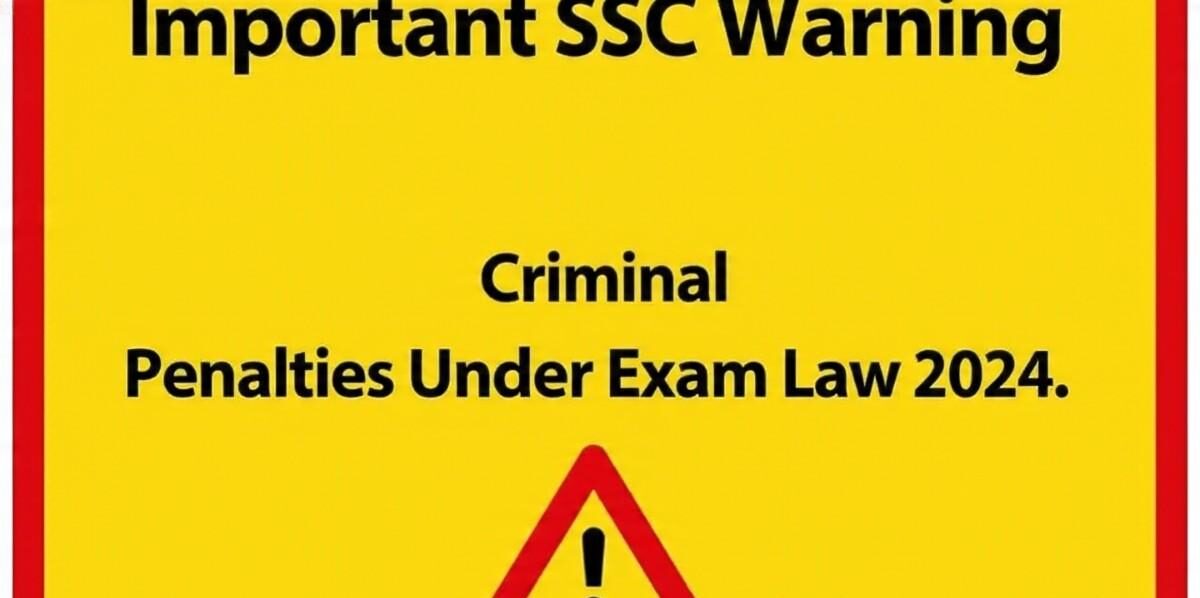SSC Warning: Criminal Penalties Under Exam Law 2024 explains how the Public Examinations Act punishes paper leaks, cheating, and exam malpractice in India.
The Staff Selection Commission (SSC), among the largest recruiting agencies in India, has released a stern advisory for candidates preparing for its competitive exams. The advisory makes it clear that discussing, sharing, or circulating question papers—whether physically or online—is now considered a criminal offense under the Public Examinations (Prevention of Unfair Means) Act, 2024.
This move is part of the government’s larger effort to safeguard the credibility of public examinations and ensure a level playing field for millions of aspirants. With competitive exams shaping the careers of lakhs of students every year, the introduction of this Act and SSC’s enforcement of it marks a turning point in India’s fight against exam-related malpractices.
Background: Why a New Law Was Needed
In recent years, India has witnessed a surge in cases of paper leaks, impersonation, mass cheating, and digital fraud during major recruitment and academic examinations. Such incidents not only damage the trust of genuine aspirants but also compromise the fairness of the selection process.
The Public Examinations (Prevention of Unfair Means) Act, 2024, was enacted to address this growing menace. It provides a legal framework to punish individuals, organized groups, or institutions involved in unfair practices related to public examinations. By criminalizing such offenses, the government aims to deter fraudsters and restore public confidence in the examination system.
Key Features of the Public Examinations Act, 2024
The law clearly defines unfair means and prescribes strict penalties. Some important provisions include:
- Criminalization of Paper Leaks and Circulation
- Any person who leaks, shares, or circulates exam papers before or during the examination commits a criminal offense.
- Even digital discussions in WhatsApp groups, Telegram channels, or social media platforms fall under its scope.
- Punishment for Individuals and Groups
- Those found guilty could face 3–5 years in jail and a fine of up to ₹10 lakh.
- Repeat offenders or organized gangs could be subject to even stricter punishments.
- Liability of Institutions
- Coaching centers, printing presses, or examination authorities found complicit in unfair practices will face action.
- Senior officials of such organizations can also be held accountable.
- Broad Coverage
- The law applies to all public examinations conducted by recruitment agencies such as SSC, UPSC, RRB, state PSCs, as well as academic boards and universities.
SSC’s Warning and Its Significance
The SSC conducts exams like CGL, CHSL, MTS, and JE, which attract millions of applicants annually. Given the stakes involved, the commission has often been a target of fraudsters attempting to manipulate exams for personal or financial gain.
By issuing this warning, SSC aims to:
- Deter malpractice by making aspirants aware of the legal risks.
- Protect genuine candidates from unfair competition.
- Strengthen exam credibility by showing zero tolerance toward misconduct.
The warning also serves as a reminder that even casual actions—like forwarding an unverified “leaked paper” on social media—could invite serious legal consequences under the Act.
Broader Implications for Aspirants
For law-abiding candidates, this law is a positive development. It reassures them that dishonest practices will not undermine their hard work. However, it also places a responsibility on aspirants to remain vigilant:
- Avoid sharing exam-related materials unless they are officially released.
- Report suspicious activities such as paper leaks or impersonation attempts.
- Stay away from coaching centers or online groups that promise shortcuts or guaranteed success through unlawful means.
Ultimately, the law seeks to reward merit and dedication while punishing shortcuts and fraud.
Conclusion
The Public Examinations Act, 2024, is a significant law aimed at making India’s examination system fairer and reliable. With SSC’s recent warning, aspirants must now exercise caution and focus solely on fair preparation.
While the penalties may seem strict, they are necessary to restore trust, fairness, and transparency in the country’s competitive exams. For genuine candidates, this is not just a law—it is a shield protecting their hard work and prospects.
FAQs on SSC’s Warning and the Public Examinations Act, 2024
What is the Public Examinations Act, 2024 all about?
It is a law enacted by the Government of India to curb malpractices such as paper leaks, cheating, impersonation, and the circulation of exam materials in public examinations.
What actions are punishable under this law?
Any form of leaking, distributing, or discussing exam question papers—offline or online—is punishable. Impersonation, mass cheating, and collusion by institutions are also covered.
Does this law apply to private coaching institutes?
Yes. If coaching centers are found to be involved in paper leaks or unfair means, they can be prosecuted. Even their officials may be held criminally liable.
Does it cover online discussions and social media?
Absolutely. Sharing or forwarding leaked papers, answer keys, or even discussing them in online groups is a punishable offense.

























